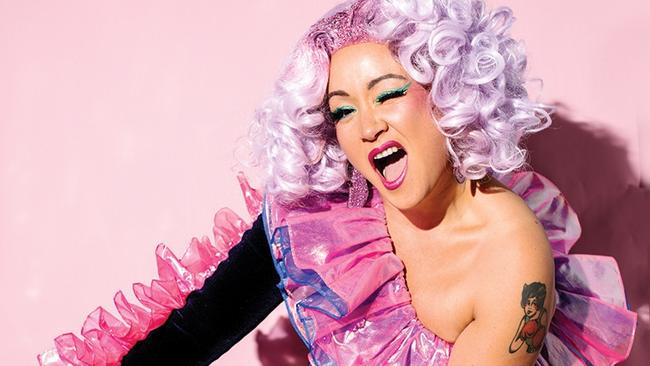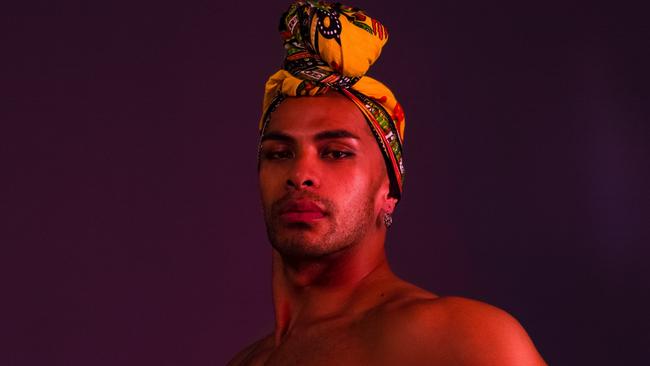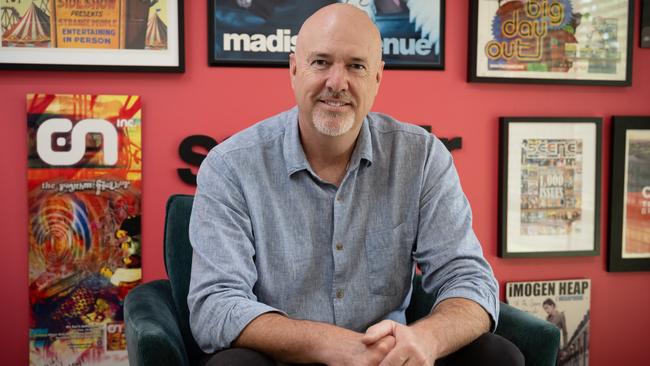Branded ‘racist’ and asked for ‘reparations’, publisher wins fight to clear name after $200k defamation suit
Two unfortunate words sparked a furious backlash against one man, with demands he pay “reparations” to atone for his “racism”.
Media
Don't miss out on the headlines from Media. Followed categories will be added to My News.
“Black pudding.”
Those two unfortunate words — used in reference to a popular Tongan and Samoan drag queen — sparked a years-long firestorm that saw prominent members of the Australian arts and LGBT community whipped up into a frenzy of condemnation.
Howard Duggan, who found himself at the centre of the controversy, apologised but insisted no offence was intended.
But for his overly “defensive” response, he was branded a “racist” who should pay “reparations to ensure the safety of our IBPOC communities” and heal the “trauma” he had caused, according to court documents in a defamation case brought by Mr Duggan in 2021.
“It is not the role of white people to determine what is, and what is not, racist,” read a fiery petition, cited the statement of claim, circulated by The People of Cabaret (POC) and signed by hundreds of members of the performing arts community.
Now, after a three-and-a-half-year legal battle, the 59-year-old has had a major win in the bid to clear his name.
Mr Duggan, the founder and publisher of Queensland-based street press magazine Scenestr, has settled the six-figure defamation lawsuit against Adelaide Fringe, well known cabaret performer Victoria Falconer-Pritchard and Sydney LGBT magazine Star Observer.
The long-running saga began in March 2021, when Scenestr published a glowing five-star review, written by contributor James Murphy, of Falconer-Pritchard’s cabaret drag brunch show Smashed at Adelaide Fringe.

The review, in keeping with the brunch theme, colourfully likened each cast member to a breakfast dish — “sourdough”, “farmer’s breakfast”, “nude fruit shake” — but when it came to describe Drag Race Down Under star Thomas Fonua, aka “Kween Kong”, Murphy used the words “the black pudding”.
The review was edited within hours to remove the phrase, at the request of a publicist for Smashed.
Murphy quickly issued an apology on social media saying he was “devastated by the hurt that has been caused”.
“I never intended it and I am committed to doing all that I can to ensure that I never cause such harm again,” he wrote.
But Falconer-Pritchard later took to social media to demand a public apology from Scenestr and Mr Duggan.
“While the description may have been unconscious and passive in its offensiveness (as racial bias so often is), this does not diminish its potency for harm,” she wrote, according to the statement of claim in Mr Duggan’s case. “No matter what the intention, the racially-motivated and casually ‘othering’ power of this review needed to be called out.”
Mr Duggan then published a lengthy defence on his website, hitting back at Falconer-Pritchard for suggesting the review was “undeniably, inexplicably racist” and insisting “all parties have accepted our writer’s words were but a misfired attempt at humour”.
“We categorically reject our review is ‘racially motivated’,” he wrote, adding of Fonua, “I apologise to him for the distress our words caused.”

In his original public statement, Mr Duggan wrote that he had been caught off guard by the request to issue a public apology and noted the author had already apologised. He added he felt it was “overreach” for Smashed’s PR representative to request that he fly from Brisbane to Adelaide to “partake in a public forum discussing racism in journalism”.
The following day, court documents show, Falconer-Pritchard blasted Mr Duggan’s response as “inflammatory” and “shockingly defensive”, accusing him of “[doubling] down, targeting me and attempting to skew and minimise my words — the words of a woman of colour, stepping in to advocate for her cast member”.
“Enough,” she wrote on social media. “I’m exhausted. People of colour are exhausted.”
Adelaide Fringe, also on the same day, took to social media saying it “stands in full support of Smashed — The Brunch Party in their request for a public apology from Scenestr … for their racist comments”.
Later that month, The People of Cabaret (POC), a collective co-founded by Falconer-Pritchard “dedicated to amplifying, uplifting, nurturing and supporting artists who are Indigenous and/or Bla(c)k and/or people of colour (IBPOC) who work in cabaret”, circulated a petition taking aim at Scenestr and Mr Duggan.
The petition claimed Scenestr “refused” to issue a public apology and accused Mr Duggan of “gaslighting” and attacking Falconer-Pritchard with “misogynistic, racist and sexist” undertones.
It did not make reference to Mr Duggan’s apology to Fonua in his response.
“We decide when language is violent and harmful, as we are the ones directly impacted by these words and actions,” the petition read. “It is not the role of white people to determine what is, and what is not, racist. Our community is in pain. It has been for centuries, and in the recent resurgence of the global protests of Black Live [sic] Matter, these conversations are not going away.”

The document suggested “some ideas of reparations that Scenstr can take to ensure the safety of our IBPOC communities”, including to “meet us and understand how you play a part in the marginalisation of our community”, make a “financial donation” or “hire us as consultants to understand how you can be a better ally”.
Mr Duggan and his company, Eyeball Media Enterprises, commenced defamation proceedings against the three defendants in the Brisbane District Court in early 2021.
In their statement of claim, the plaintiffs alleged they had been defamed as condoning racism, had refused to apologise for publishing racist material, and instead “published an aggressive attack against the person who requested the apology, a woman of colour”.
The claim sought damages for the “substantial hurt, distress, embarrassment, humiliation and ridicule” to Mr Duggan and the impact on his business.
The District Court hears claims ranging from $150,000 to $750,000. People familiar with the case said they were told at the time Mr Duggan had been seeking a combined $200,000 in damages from the three defendants.
The parties went to mediation late last year and the case was settled for an undisclosed sum. Star Observer, which was sued over an April 2021 online article about the controversy, has since taken down the page.
Mr Duggan told news.com.au he was unable to discuss the terms of the settlement but was happy with the outcome.
“I’m pleased the matter we commenced in mid-2021 has been resolved and is now at an end,” he said in a statement.

One producer and entrepreneur with many years of experience at Adelaide Fringe, who spoke on the condition of anonymity, said due to the political climate few in the community were willing to publicly defend Mr Duggan at the time.
“We’re in a culture where people are at their most sensitive,” he said.
News.com.au has obtained copies of written apologies from Falconer-Pritchard and Heather Croall, director and chief executive of Adelaide Fringe, sent to a number of Mr Duggan’s clients.
“We write to you in relation to the publication made by us on social media regarding the publication of a review of the stage production Smashed and the use of language by the writer of that review,” Ms Croall wrote.
“We made the post in support of Fringe artists but we accept that the post caused you damage and we apologise for that damage.”
Falconer wrote that she had “come to understand, acknowledge and accept that my posts made with respect to the conduct of Scenestr and you as publisher in response to your above matter, were considered defamatory and for that I apologise”.
Falconer-Pritchard, Ms Croall and Star Observer did not respond to requests for comment.
Originally published as Branded ‘racist’ and asked for ‘reparations’, publisher wins fight to clear name after $200k defamation suit





